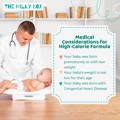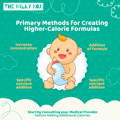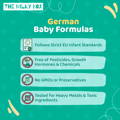The method you choose will significantly depend on each family’s circumstances and specific goals. Still, there are four techniques that most healthcare providers will suggest to increase your baby’s caloric intake as needed:
● Increase concentration: This method requires a unique formula requiring less water to be added, thus creating a calorically denser product per oz.
● Addition of formula: Some doctors recommend adding a specific formula to previously pumped milk. This gives 2 in 1 benefits, they’re still getting their nutrition from mom while increasing each nutrient proportionally.
● Specific nutrient addition: Some infants only require the addition of a particular ingredient in their diets, such as glucose polymers, protein powder, medium-chain triglycerides, vegetable oil, or fat emulsions. Their qualified provider will determine the exact nutrients they need and the amount to add to their meals. This is particularly useful in babies with a deficiency in their protein intake.
● Combination: Depending on the medical reason your baby needs dietary supplementation, your practitioner might prescribe a mix of any of the three above-mentioned techniques distributed among their mealtimes. For example, their breakfast might need extra glucose, while the rest of their feedings might need increased concentration in their bottle.








